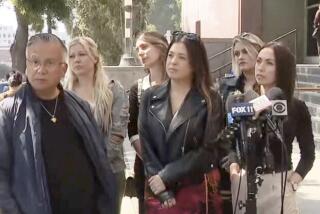Plaintiff in Libel Suit Must Prove Defamatory Words Are False, High Court Says
- Share via
WASHINGTON — The Supreme Court, in a victory for the news media, ruled today that anyone who sues for libel has the burden of proving the defamatory statement is false.
In a 5-4 decision in a case involving the Philadelphia Inquirer, the court strengthened protection against libel suits in cases where a so-called “private individual”--rather than a public figure--sues a news organization.
Justice Sandra Day O’Connor, writing for the court, said, “We hold that, at least where a newspaper publishes speech of public concern, a private-figure plaintiff cannot recover damages without also showing that the statements at issue are false.”
She added: “We recognize that requiring the plaintiff to show falsity will insulate from liability some speech that is false, but unprovably so. Nonetheless, the court’s previous decisions on the restrictions that the First Amendment places upon the common law of defamation firmly support our conclusion here with respect to the allocation of the burden of proof.”
‘Pernicious’ Ruling
In a dissenting opinion, Justice John Paul Stevens said the ruling is “pernicious” because the only publishers “who will benefit from today’s decision are those who act negligently or maliciously.”
For a private citizen to win a libel suit, the law has always required that the allegedly libelous statement be found false and made negligently. Truth is an absolute defense.
But before today, the court had not said whether the Constitution’s guarantee of free speech places the burden of proving truth or falsity in such cases on the plaintiff or defendant. In practice, the burden of proof before now has rested in some cases on defendants and in some cases on plaintiffs.
In today’s case, Maurice S. Hepps, principal stockholder of General Programming Inc., sued the Philadelphia Inquirer in 1976 over a series of articles that attempted to link beer and beverage distributorships operating as General Programming franchises to certain underworld figures.
Hepps said the articles defamed him by implying that the distributorships had ties to organized crime.
Jury Ruled for Paper
After a six-week trial in 1981, state Judge Leonard Sugerman told jurors that Hepps and the corporations that sued the Inquirer had the burden of proving that the articles were false. The jury ruled for the newspaper and Hepps appealed.
In other action today, the court:
--Agreed to decide whether all recipients of federal aid, including virtually all public schools, are barred from discriminating against people with contagious diseases, including AIDS.
--Agreed to decide whether the government may label as “political propaganda” three Canadian films on acid rain and nuclear war.
--Agreed to decide whether states must pay unemployment benefits to women who are not reinstated in their jobs after taking maternity leaves.
--Let stand the criminal conviction of U.S. District Judge Harry E. Claiborne, the first sitting federal judge ordered to prison.
--Let stand a federal law exposing the buyers of child pornography to stiff criminal penalties.
--Refused to force the Food and Drug Administration to hold public hearings on the use of the artificial sweetener NutraSweet in soft drinks.
More to Read
Inside the business of entertainment
The Wide Shot brings you news, analysis and insights on everything from streaming wars to production — and what it all means for the future.
You may occasionally receive promotional content from the Los Angeles Times.










